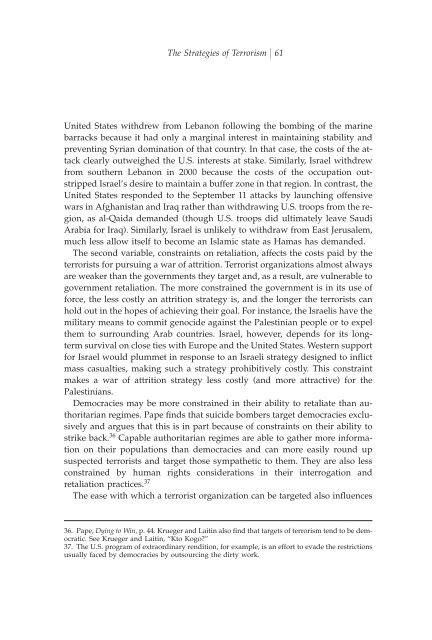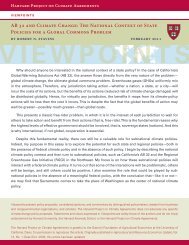The Strategies of Terrorism - MIT Press Journals
The Strategies of Terrorism - MIT Press Journals
The Strategies of Terrorism - MIT Press Journals
Create successful ePaper yourself
Turn your PDF publications into a flip-book with our unique Google optimized e-Paper software.
<strong>The</strong> <strong>Strategies</strong> <strong>of</strong> <strong>Terrorism</strong> 61United States withdrew from Lebanon following the bombing <strong>of</strong> the marinebarracks because it had only a marginal interest in maintaining stability andpreventing Syrian domination <strong>of</strong> that country. In that case, the costs <strong>of</strong> the attackclearly outweighed the U.S. interests at stake. Similarly, Israel withdrewfrom southern Lebanon in 2000 because the costs <strong>of</strong> the occupation outstrippedIsrael’s desire to maintain a buffer zone in that region. In contrast, theUnited States responded to the September 11 attacks by launching <strong>of</strong>fensivewars in Afghanistan and Iraq rather than withdrawing U.S. troops from the region,as al-Qaida demanded (though U.S. troops did ultimately leave SaudiArabia for Iraq). Similarly, Israel is unlikely to withdraw from East Jerusalem,much less allow itself to become an Islamic state as Hamas has demanded.<strong>The</strong> second variable, constraints on retaliation, affects the costs paid by theterrorists for pursuing a war <strong>of</strong> attrition. Terrorist organizations almost alwaysare weaker than the governments they target and, as a result, are vulnerable togovernment retaliation. <strong>The</strong> more constrained the government is in its use <strong>of</strong>force, the less costly an attrition strategy is, and the longer the terrorists canhold out in the hopes <strong>of</strong> achieving their goal. For instance, the Israelis have themilitary means to commit genocide against the Palestinian people or to expelthem to surrounding Arab countries. Israel, however, depends for its longtermsurvival on close ties with Europe and the United States. Western supportfor Israel would plummet in response to an Israeli strategy designed to inºictmass casualties, making such a strategy prohibitively costly. This constraintmakes a war <strong>of</strong> attrition strategy less costly (and more attractive) for thePalestinians.Democracies may be more constrained in their ability to retaliate than authoritarianregimes. Pape ªnds that suicide bombers target democracies exclusivelyand argues that this is in part because <strong>of</strong> constraints on their ability tostrike back. 36 Capable authoritarian regimes are able to gather more informationon their populations than democracies and can more easily round upsuspected terrorists and target those sympathetic to them. <strong>The</strong>y are also lessconstrained by human rights considerations in their interrogation andretaliation practices. 37<strong>The</strong> ease with which a terrorist organization can be targeted also inºuences36. Pape, Dying to Win, p. 44. Krueger and Laitin also ªnd that targets <strong>of</strong> terrorism tend to be democratic.See Krueger and Laitin, “Kto Kogo?”37. <strong>The</strong> U.S. program <strong>of</strong> extraordinary rendition, for example, is an effort to evade the restrictionsusually faced by democracies by outsourcing the dirty work.














